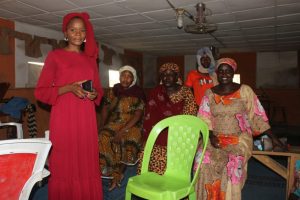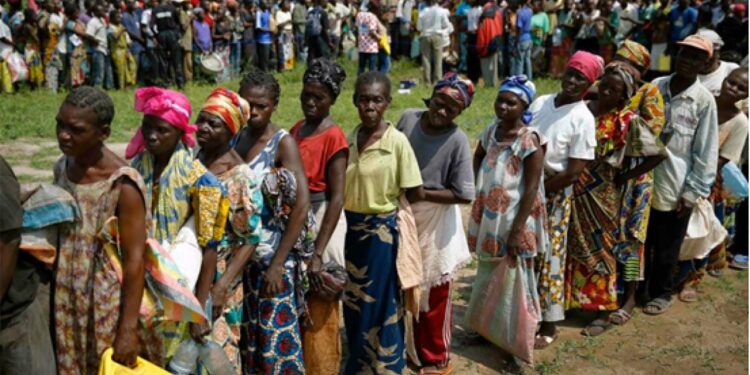The displaced adolescent girls and women who are mostly from Gwoza Local Government Area of Borno state have lamented about how they use their old clothes as rags during their monthly period which is unhygienic and exposes them to virginal infection as the price of sanitary pad is too high that they cannot afford.
The internally displaced girls and women in the EYN CAN center (IDP camp) said, they have not used sanitary pad ever since they started living in the camp for over five years except rags. One of the displaced girls, a 14-year-old Lami Imaru said, she found it difficult to get money to buy sanitary pads for herself because of her situation and as such, has been using rag in place of a sanitary pad for the past three years now.
Lami further stated that she uses her old clothes whenever she is menstruating and it’s usually unhygienic which often causes virginal infection for her.
“We find it very difficult to buy sanitary pads, so as a result of that we started using rags, we tear our clothes and used them as sanitary pads,” Lami added.
Lami who is currently pursuing her National Diploma at the Raman polytechnic Marduguri explained that whenever she is menstruating she feels so miserable and cannot go to school.
Lami who lamented that she has been detaching herself from people in public places mentioned that “in schools and religious gatherings, I find it difficult to sit comfortably with people because the blood will be smelling out of the rag so as a result of that, I try to stay on the camp whenever I’m menstruating and it has made me to detach myself from people which is not good for me at our age.”
Also speaking, Victoria Phillip, a 43 age old widow who is also living in the camp due to the insurgencies said, she feels ashamed whenever she uses a rag during her monthly period because she cannot afford to buy a sanitary pad for herself and her daughters. She said, most of the women and girls living in the camp her prone to infection because they don’t have detergent and disinfectant to disinfect the rag they used for their monthly period.
“We are just using rag because of the high cost of everything this time around. we don’t have money to buy just tissue and this sanitary pad. As a widow, I have five grownup girls and they are using rags together with me. As a widow, I can’t afford to get money to purchase pad for myself, let alone the five girls I have,” Philip added.
Philip, a mother of nine among which her five girls are already menstruating, said they used local ash to wash and disinfect the rag they used for their monthly period.
“A lot of times, we use ashes because we don’t have money to buy soap, that’s why we don’t want to dry it outside because people will see it, so we have to get a place where people cannot see it when we dry it,” she added.
Another pathetic way which these women wash their mensuration rag is using the back of strawberry tree which Mrs. Lai Matthew said they get from a nearby community to get. “We always go to the bush, pluck some branches of strawberry tree and use it to wash our rags,” she mentioned.

Also speaking about the plight of the internally displaced women and girls, the chairperson network for Women led civil society organization in Borno, Mrs. Ladi Clark said, they are aware of the challenges faced by women and girls living in IDP camps as a result of the high in the price of sanitary pad and as Women-led organizations, they are putting resources together to overcome the problem.
Clark further stated that, as Women led organization, they are concerned about the horrible experiences of the displaced women and girls especially when it comes to menstrual hygiene and they are collaborating with other well-meaning individuals and organizations to address the issues.
She said, “as Women-led organizations, we find this as an issue of concern and we’re working together to see how we can provide the necessary support to overcome this issue of pad scarcity.
“We have planned to reach out to funding organizations like the international NGOs that it is within their capacity to provide sanitary products to women. Organizations like EAL women, ANLPA and we are going to reach out to them very soon, so that they can do something and these girls can go back to school because a lot of them, during their menstruation do not go to school,” she added.
The Chairperson thereafter called on the Borno state government and other well-meaning individuals to provide free sanitary pads to women and girls living in the internally displaced persons’ camp and the state at large.
“I’m calling with a large voice that every action, the ministry of women affair, schools, principals, ministry of education will have a part to play in providing this vital and important issue in the lives of girls and women,” she buttressed.
The report by Monday Solomon was initially produced in audio format for Kanem FM Unimaid Radio 97.7, Borno State.

